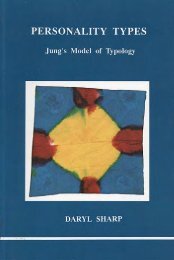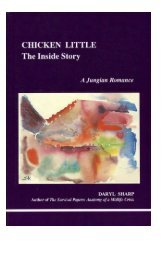Digesting Jung: Food for the Journey - Inner City Books
Digesting Jung: Food for the Journey - Inner City Books
Digesting Jung: Food for the Journey - Inner City Books
Create successful ePaper yourself
Turn your PDF publications into a flip-book with our unique Google optimized e-Paper software.
Self-Knowledge and Statistics 91<br />
and by <strong>the</strong> silence of o<strong>the</strong>rs who <strong>for</strong> one reason or ano<strong>the</strong>r indulge<br />
us. To really get a handle on ourselves we need an honest, objective<br />
mirror, which our intimates rarely are. The unconscious, in its many<br />
manifestations through dreams, visions, fantasies, accidents, active<br />
imagination and synchronicity, is a ra<strong>the</strong>r more unsparing mirror,<br />
and analysts are trained to interpret <strong>the</strong> reflections.<br />
Again and again, patients dream of analytic work as a refreshing<br />
and purifying bath. Symbols of rebirth frequently appear in <strong>the</strong>ir<br />
dreams. The knowledge of what is going on in <strong>the</strong>ir unconscious<br />
gives <strong>the</strong>m renewed vitality.<br />
There are many methods and techniques espoused by <strong>the</strong>rapists<br />
of different schools, but <strong>Jung</strong>’s view was that technique is not important.<br />
What matters is ra<strong>the</strong>r <strong>the</strong> analyst’s own self-knowledge<br />
and continuing attention to his or her own unconscious. Analysis is<br />
in fact both a craft and an art. Whatever school an analyst trains in,<br />
he or she is obliged to deal in an individual way with what comes in<br />
<strong>the</strong> door. <strong>Jung</strong> said that when a unique, suffering person was in<br />
front of him, he put <strong>the</strong>ory on <strong>the</strong> shelf and simply listened. Only<br />
after he had heard <strong>the</strong> conscious facts did he look <strong>for</strong> compensating<br />
messages from <strong>the</strong> unconscious.<br />
Self-knowledge can be <strong>the</strong> antidote to acute depression or a pervasive<br />
malaise of unknown origin, both particularly common in<br />
middle age. And it can be a spur to an adventurous inner life—<strong>the</strong><br />
heroic journey, as it may be called. Understanding oneself is a matter<br />
of asking <strong>the</strong> right questions, again and again, and experimenting<br />
with answers. Do that long enough and <strong>the</strong> capital-S Self, one’s<br />
regulating center, is activated.<br />
Marie-Louise von Franz says that having a relationship with <strong>the</strong><br />
Self is like being in touch with an “instinct of truth”—an immediate<br />
awareness of what is right and true, a truth without reflection:<br />
One reacts rightly without knowing why, it flows through one and<br />
one does <strong>the</strong> right thing. . . . With <strong>the</strong> help of <strong>the</strong> instinct of truth,<br />
life goes on as a meaningful flow, as a manifestation of <strong>the</strong> Self. 82<br />
82 Alchemy: An Introduction to <strong>the</strong> Symbolism and <strong>the</strong> Psychology, pp. 172f.










